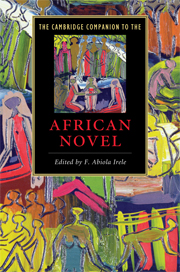Book contents
- Frontmatter
- 1 Introduction: perspectives on the African novel
- 2 The oral-literate interface
- 3 Chinua Achebe and the African novel
- 4 Protest and resistance
- 5 The Afrikaans novel
- 6 The African novel in Arabic
- 7 The francophone novel in North Africa
- 8 The francophone novel in sub-Saharan Africa
- 9 The African historical novel
- 10 Magical realism and the African novel
- 11 The African novel and the feminine condition
- 12 Autobiography and Bildungsroman in African literature
- 13 The postcolonial condition
- 14 New voices, emerging themes
- 15 The critical reception of the African novel
- Bibliography
- Index
12 - Autobiography and Bildungsroman in African literature
Published online by Cambridge University Press: 28 January 2010
- Frontmatter
- 1 Introduction: perspectives on the African novel
- 2 The oral-literate interface
- 3 Chinua Achebe and the African novel
- 4 Protest and resistance
- 5 The Afrikaans novel
- 6 The African novel in Arabic
- 7 The francophone novel in North Africa
- 8 The francophone novel in sub-Saharan Africa
- 9 The African historical novel
- 10 Magical realism and the African novel
- 11 The African novel and the feminine condition
- 12 Autobiography and Bildungsroman in African literature
- 13 The postcolonial condition
- 14 New voices, emerging themes
- 15 The critical reception of the African novel
- Bibliography
- Index
Summary
This chapter offers some generalizations regarding the place of autobiography and Bildungsroman in African literature. Although there appears to be a radical opposition between the “factual” autobiography and the “fictive” Bildungsroman, there are considerable correspondences and convergences, at least in the African context, between the two in terms of context, content, and form. An autobiography refers to an account, typically in the first person, retrospectively documenting the life of a real person who serves as both narrator and protagonist. The term Bildungsroman refers to a so-called “novel of formation,” that is, a fictional account tracing, usually in the third person, the spiritual, moral, psychological, or social growth of a fictional protagonist, typically from childhood to maturity. For all their normative insistence on literal truthfulness, autobiographies are carefully constructed esthetic objects. As Philippe Lejeune succinctly observes, “the paradox of the literary autobiography, its essential double game, is to pretend to be at the same time a truthful discourse and a work of art.” Under the guise of merely reproducing the story of a real-life character, the genre relies on a complex (and not always self-conscious) interplay among remembering, forgetting, revising, inventing, selecting, and arranging events. At the same time, even though the Bildungsroman – like any other work of art – normatively eschews literal truth claims, it nevertheless makes, under the guise of fiction, large truth claims about specific historical, political, and cultural contexts.
- Type
- Chapter
- Information
- The Cambridge Companion to the African Novel , pp. 195 - 208Publisher: Cambridge University PressPrint publication year: 2009
- 9
- Cited by



